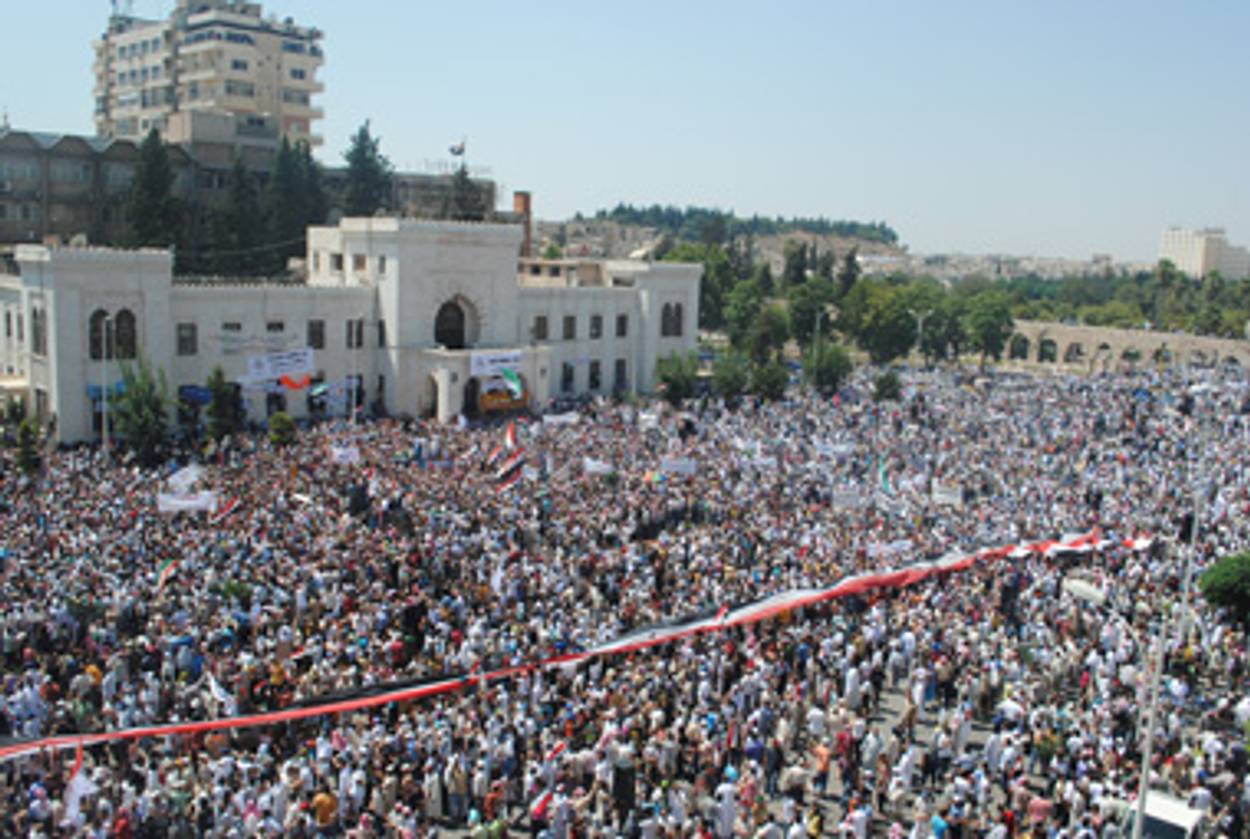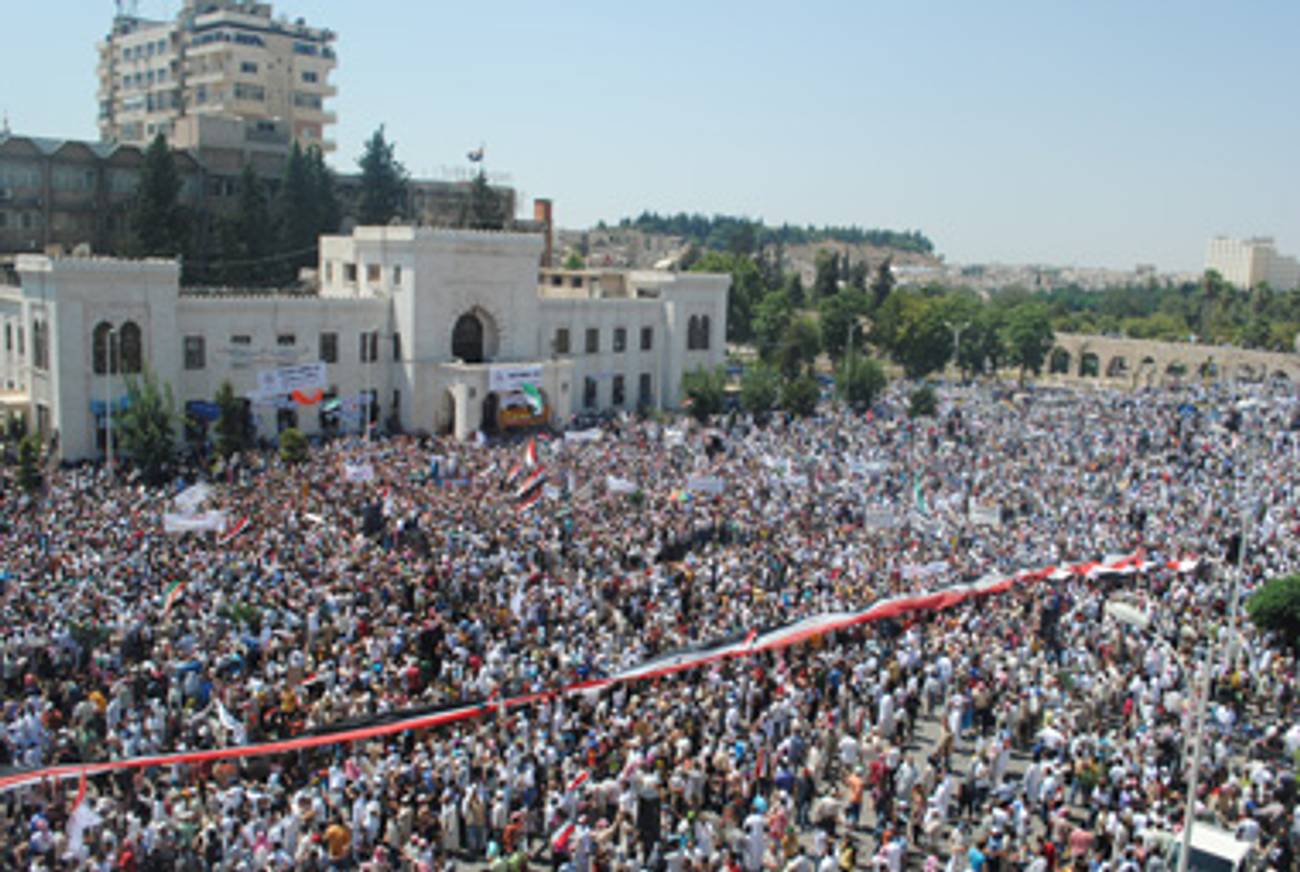Assad Cracks Down Hard in Hama
Obama condemns assault on civilians, again stops short of demanding ouster




The experiment in semi-freedom in the Syrian city of Hama, which President Bashar Assad’s forces withdrew from in June—not long after U.S. ambassador Robert Ford visited it and demanded that the government cease violence—ended with a horrific roar yesterday. Syrian tanks moved into several restive cities; in Hama, artillery pounded residential neighborhoods and soldiers shot unarmed, peaceful protesters. (If you want to see the grisliness for yourself, search “Hama” on YouTube.) Hama looms large in Syrians’ memory as the site of a 1982 massacre that killed 10,000 and was perpetrated, in part to put down an Islamist uprising, by Bashar’s father, Hafez Assad. Coming a day before the Muslim holy month of Ramadan begins, the fierce crushing at once was an attempt to shore up the regime’s power and a sign that it may—finally!—have crossed a line that many have said it had long ago crossed as well as definitively shown that Assad is not interested in reform (though, again, many said he’d demonstrated this long ago). Dozens were reported killed, scores more injured, and this in addition to the 3,000 Syrians whom one activist group claims have “disappeared” since the uprisings began in March.
The crackdown prompted the strongest response yet from the Obama administration yet, some will argue, not response enough. “Once again, President Assad has shown that he is completely incapable and unwilling to respond to the legitimate grievances of the Syrian people,” said President Obama in a statement. “The United States will continue to increase our pressure on the Syrian regime and work with others around the world to isolate the Assad government.” The words may seem harsh, but compare the Syrian situation to the similar deadly repression of Libya’s rulers and the subsequent Western, U.S.-backed military intervention and formal recognition of a ragtag, possibly Islamist opposition as the legitimate government; by contrast, the U.S. has not even demanded that Assad step down. (Germany has requested that the U.N. Security Council meet today to discuss Syria.)
Late last week, congressmen from both parties sharply criticized State Department officials for lukewarm responses to the crisis. “How many must die before we have the courage to stand up and say that Assad is illegitimate and he must go?” asked a Republican committee chairman, while the Democratic ranking member accused the administration of “hedging our bets here on the odd chance that he’s going to be able to hang on.”
In June, when Ambassador Ford visited Hama and made his noise, you could plausibly argue that here was engagement with a vile regime that could possibly bear fruit—the withdrawal of Syrian forces from Hama. However, now that it is clear as can be that Assad is trying to murder and rope-a-dope his way out of this—and doing so by going right to where the U.S. had staked its largest symbolic claim—continuing to hold back, as the administration has done, seems dissonant.
It also seems foolish. The region’s most successful political gambler, Lebanon’s Walid Jumblatt, recently indicated that he is placing his chips on Assad’s downfall. “His latest remarks, the strongest yet, indicate that the Druze leader senses the Assads are on their last legs,” reported Michael Young. “His dismissal of a ‘resistance system’ was effectively a denunciation of states and organizations—principally Syria, Iran, and Hezbollah—that have taken pride in forming a unified front to combat what they deem to be Israeli and Western dictates.” True to form, yesterday Assad pledged to stay his “resistant course,” spoke of “conspiracies,” and reiterated the importance of “Israeli withdrawal from the occupied Arab lands up to the June 4th, 1967 line.” I’m not a regional expert, but I would be very surprised if that is what is foremost on the minds of the brave, endangered citizens of Hama right now.
Syrian Tanks Storm Protest Epicenter of Hama [WP]
Dozens Killed as Syrian Forces Storm Restive Cities [NYT]
Germany Requests Urgent UNSC Meeting on Syria [JPost]
Tough Bipartisan Questioning by Congress of U.S. Policy on Syria [LAT]
Lebanon’s Political Bellwether Turns Away from Syria [The National]
‘Assad: Syria Target of Foreign Conspiracy’ [DPA/Haaretz]
Earlier: The Semi-Free City of Hama
Ambassador Ford Stands Up for Syrians
Marc Tracy is a staff writer at The New Republic, and was previously a staff writer at Tablet. He tweets @marcatracy.